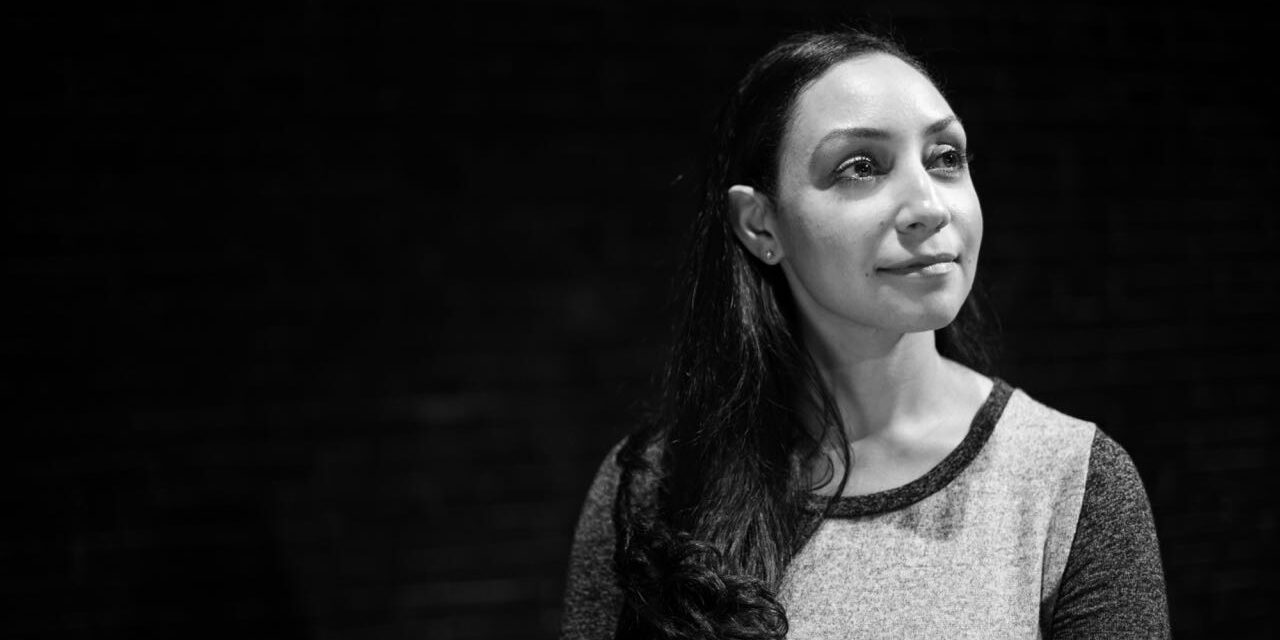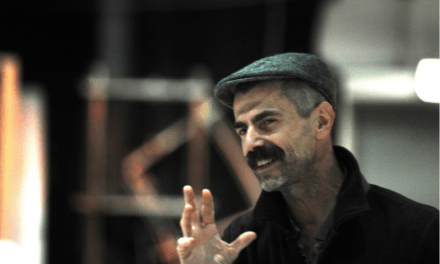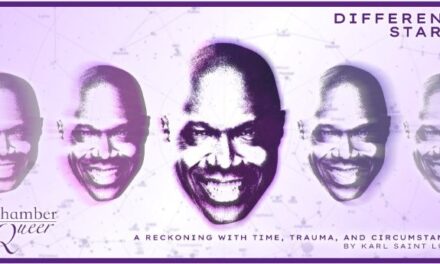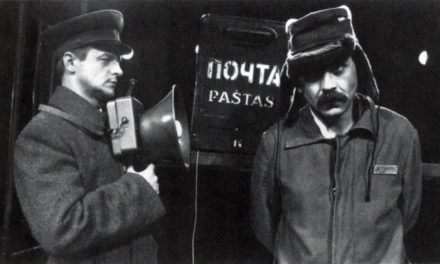We live in a world that is demanding change, moving at a rapid pace while simultaneously crawling along. Where I’ve seen many theaters particularly quick to respond publicly, is in regard to the Black Lives Matter movement. But how do we respond with authenticity, without being performative? How do we contribute to the progress while continuing to make theatre?
I am far from having all the answers, but one thing I’m learning is that we each have a specific role to play. As a director, one of the questions that have been at the forefront for me has become quite complex in conversation with colleagues. What shows should I be directing? There are many stories that are long overdue in being told, but what stories should I be at the helm for as a white female director?
In search of some unraveling around this topic, I sat down with the playwright and Executive Director of The Fire This Time Festival, Kelley Girod. This woman has been championing black writers for over a decade and continues to inspire with her endless compassion for not only her artistic endeavors but for the humans, she comes into contact with every day.
Jennifer Delac: So I want to go back to the beginning a little bit, what sparked your founding of The Fire This Time Festival ten years ago?
Kelley Girod: Short story, the knowing, and it had been confirmed, that it was going to be way harder for me as a female black playwright to get traction with my work, because I don’t think that people felt that they could easily define me or my work. That was pretty much confirmed in one of my first interactions in my thesis year. I kind of just felt that I would need to forge a space for myself, to really be able to establish my own voice, and to establish myself on my own terms. That was really one of the main motivations. I figured that there were probably other people who felt the same way; other black artists, black playwrights who felt the same way. Turned out to be right. That’s really what started [the Festival], knowing in the back of my head that there was going to be a desire by the industry to try to box me into something. Or to just say, we don’t understand your body of work, we can’t easily define you. And so, therefore, we can’t produce you. So yeah.
JD: What is the impact that you’ve noticed, on the kind of work that is being created, that is being put into the world and produced?
KG: I think that I’ve definitely seen, over the past decade, there are a lot of different types of theater, stories coming from black artists, that I think when I graduated from Columbia [University], thirteen years ago, I didn’t see. I felt like I did not see the variety and storytelling from the black perspective that I’m seeing now. I think when you see plays when you see a black sci-fi, or you see black musicals that are . . . I’m trying to think of the things that have impacted me the most. In general, there was kind of this industry-standard of what people thought black stories were or what black stories had to be in order for them to be promoted. I’ve even seen black playwrights have the freedom to write about white people and what it means to be a black person in a white space. I think of Eboni Booth’s play Paris, which was at [the] Atlantic Theater [Company], and in that play, there were only two black characters. The majority of the characters [were white]. So I think just the idea of what our experiences are, how we’re experiencing them, and how that informs our writing and what we’re capable of writing. I feel like I’ve really seen more [of] that [in] the industry, allowing us to have more and different kinds of voices.
JD: I’m curious because you’re also the executive director, what the process is when you bring in directors to work with your playwrights for the festival. What is that process like? What do you look for in directors, when pairing them with playwrights?
KG: You know, the process, it changed from the beginning. It used to be that the playwrights would choose their director. So we would have six to seven playwrights and we’d have six to seven directors. Every piece had a different director, had a different cast, different ensemble, and maybe it was around year five or six, we changed all that. We had one director who was assigned, who we essentially chose ahead of the season. I think the first year we did that was Nicole Watson. There are a lot of directors that have been working in the community for a long time and we generally try to go with a director who’s already kind of embedded in the community because of the nature of the work that we do. There’s so much overlap in the work. I jokingly say that we produce a family reunion every year, because you step into The Fire This Time, and everybody knows each other. So we generally try to find a director, who’s been working in the community for a little while, and really knows the community. And the playwrights already kind of have that built-in trust.[…] So the process is usually not that expansive, and we’ll sit around and we’ll just say, who do we want to work with next year and then we’ll pull up our list and just go from there. We generally try to have it switch from year to year. So if we had a female-identifying director the year before, we’ll try to have a male-identifying director next year and kind of switch it off that way.
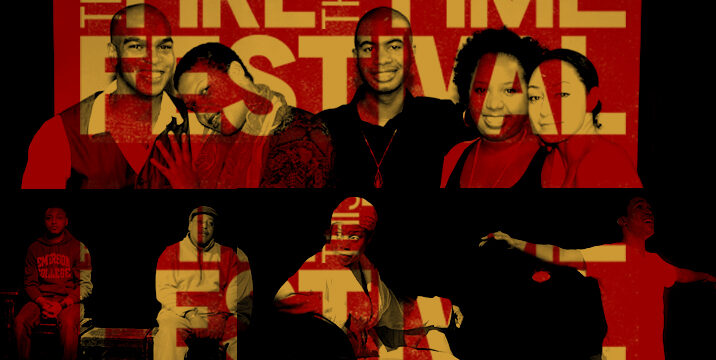
The Fire This Time Festival with Horse Trade Theater. Pousada Azul. Written by Nathan Yungerberg, directed by Russell G. Jones. Kelley Girod featured in the top row, right.
JD: What makes a director somebody that you collectively decide you are excited to work with? [That] you want to have in the room to help bring these stories to life?
KG: I think it’s always great when there is somebody you know in the theater. Everything is reputation and relationship. I think that you’ll probably hear this a lot, you can be as talented as you want to be but if you’re difficult to work with, nobody’s going to work with you. And it really is true. I think one thing that we really, really strive for is for our actors and our creative staff, to always feel comfortable, to feel like there’s a safe environment. Word gets around about who is fostering those kinds of environments for their artists. We think a lot with that in mind. That’s probably at the top of our list.
But it’s also a black director, recognizing what it means for black people to be in any of these [predominantly white] spaces. I just love the way that Zhailon works. I was able to work with him on Nathan Yungerberg’s piece for the Sheen Center Theater Festival. I love the way that he walks into the building. He […] was able to speak to me and the staff about what that means for his all-black cast. How do we come into this room together? How did you make this a safe environment for him? So, it’s not just the director saying, okay, I’ve got to approach the piece in this way. I think that’s a big deal to us.
JD: When you were talking about the first five years at The Fire This Time, the playwrights got to choose their directors and bring them in, did they all bring in directors of color?
KG: No, in fact, the first year, my director was Michael Rau. He is white, male-identifying, and he and I collaborated at Columbia [University] often on projects, so I just automatically trusted him. There were many years where we had directors of every different kind of background. It was totally up to the playwright to choose who they were comfortable with, and who they were comfortable having worked on that piece, in that space with them. Now that we choose directors, we do choose black directors specifically. And that is because we do want to maintain the festival as a black centering festival. We want to give opportunities to black creatives. We all know that black creatives don’t often get that many opportunities to be in the room. It’s one of the trials of our time.
JD: We talk about the playwright having the voice, giving voice to this piece, and then the director sort of steering that with an overall vision. How is that magnified when you have both a black playwright and a black director paired together to bring this story to life? How does that change the piece? Have you noticed a major difference?
KG: That’s a question that’s very difficult for me to answer because every director is going to bring what they bring to it. A black playwright may choose a white director for a black play, and that be the right choice for them. For our purposes, we are a black centered play festival. I think that because of the nature of our festival, and that for many of the playwrights, it’s [their] first time being produced professionally in New York City, I think one thing that is really important for us is that those playwrights have an experience where they feel like they can be authentically who they are. They feel that there are safety and security speaking to the director, in a way that if you were in a room with all white creatives, you may not feel. With that sense of safety and security, you may not feel the first time that you can really be who you are. You may compromise on yourself; you may not listen to your own levels of discomfort. […] It’s the individual pieces, but the individual pieces come together as a whole, and what the festival is doing as a whole is fostering this very secure and safe moment and environment for something great to happen.
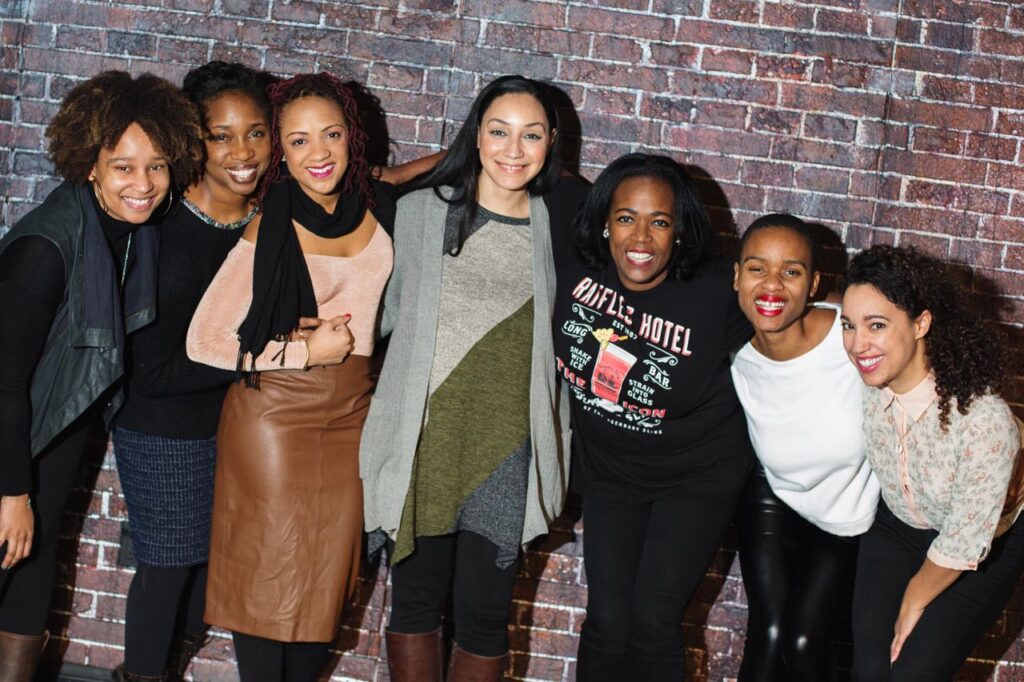
The Fire This Time Festival: Roundtable. Featured: Charly Evon Simpson, Sandra A. Daley-Sharif, Candis Jones, Kelley Girod, Mona R. Washington, Gethsemane Herron-Coward, and Shelley Fort. Photography by Tess Mayer.
JD: We hear a lot right now [from] students [who] want to work on certain pieces, but they want a black director to direct that piece. I see so many reasons why that makes sense. Particularly if it’s a story that is about race, because you want someone to lead that project who understands it in a way and has a personal connection to that story. What I’m synthesizing is that maybe […] a lot of [who directs a piece] comes down to what you keep talking about, the comfort of the other creatives in the room to be vulnerable and bring about their best work. It’s more about that than it is about a right or wrong person to direct a piece because of the subject.
KG: Yeah. If a black playwright, said to you, hey Jen, I wrote this piece, and I really want you to direct it. If you’re being given that opportunity? I mean, [do it]. I 1,000% agree with you that, you want to find where your personal connection is, but I would say any piece that is about race is about all of us. I think it is everybody’s duty to find out what that means for them. If somebody is writing a piece about, white, black or whatever, I think for too long it’s been, there’s this piece about this, I don’t want to touch it with a 10-foot pole, because I really shouldn’t be the one to direct this. Well, why not? You need to question that. Maybe there’s some education you need to do; maybe there’s a deep dive that you need to do. It’s for all of us to be able to do that work.
When Eboni Booth was doing her play Paris at Atlantic, her director was Knud Adams, a white guy okay. But she wanted him to direct this piece. She was feeling so self-conscious, because he’s a white guy, and like the black community is going to feel a certain type of way. I was like, Eboni, you chose this director for a reason. You trust him. There’s something about the rapport or the work that he’s doing that makes you feel comfortable with this piece in his hands. Why shouldn’t he direct that? Whatever process he is going through with understanding his white privilege or being able to understand enough to direct those people in that story or understand those white people in that story, that’s as much about him as it is about the racism that the black characters experience. We are all in this, so it’s taking on that responsibility that’s for everybody. If it is brought to your table and you want to do it, you also have to want to accept all of the work that goes into it, including knowing what your position is as a white person. This is how I need to set up the room. This is how I need to set up the culture, before we even sit down to a table read.
Transcribed by Otter.
Kelley Nicole Girod is an award-winning playwright (Atlantic Launch New Play Commission 2019, Sheen Center Fellow 2019, Stein and Liberace Fellow 2007, John Golden Fellow 2008) whose work has been developed/presented at Atlantic Theater Company, Sheen Center for Thought and Culture, The Fire This Time Festival, Harlem 9, Primary Stages, Project Y, Poetic Theater Productions, Classical Theater of Harlem, Frigid NYC, Planet Connections Theater Festival, The Field, and Dixon Place. She has recently been commissioned by Stanford University for their TAPS program. Kelley has had the pleasure of working with Frederick Zollo, Keith Beauchamp, and Michael JP Reilly as script consultant on Zollo Productions Film The Untold Story of Emmett Louis Till (2018). Kelley’s essay “About Alice or When Social Distancing Ends” was recently published in The Flashpaper: Theater’s Thoughts on Right Now, and was also published in American Theater Magazine 2020. Kelley Nicole Girod also works as a producer in NYC and founded the OBIE Award-winning, groundbreaking new play festival for Black playwrights, The Fire This Time Festival, going into its 12th season this year and is currently featured on PBS AllArts, NYtimes, and Playbill. Outside of the festival, Kelley has produced and curated at The Sheen Center and served as Producing Director at The Billie Holiday Theater from 2014-2015. She has also produced events with Frederick Zollo and Keith Beauchamp over the years. Kelley has also served as a guest lecturer at Yale School for Drama and Stanford University’s Theater Department. Kelley is a 2008 Graduate of Columbia’s MFA Playwriting Program
Jennifer Delac is currently an MFA Directing Candidate at Penn State University under the mentorship of Susan H. Schulman. She holds a BA in Theatre from Fordham University (Lincoln Center) and has a background as a dancer, Equity Stage Manager, and SDC Associate Director/Choreographer. Select credits include: The Beast in the Jungle (as the Observer to Susan Stroman, Vineyard Theatre), Song From the Uproar (AD, LA Opera/BMP), The Wong Kids (Choreographer/ASM, Ma-Yi Theatre), Mr. Burns (Choreographer/Assoc. Director, Fordham), and TEXAS a Musical Drama (Asst. Choreographer/Dance Captain). Jennifer is currently the cohost of the podcast What I Don’t Know Yet, Research in Performance (which can be streamed on Spotify).
This post was written by the author in their personal capacity.The opinions expressed in this article are the author’s own and do not reflect the view of The Theatre Times, their staff or collaborators.
This post was written by Jennifer Delac.
The views expressed here belong to the author and do not necessarily reflect our views and opinions.

